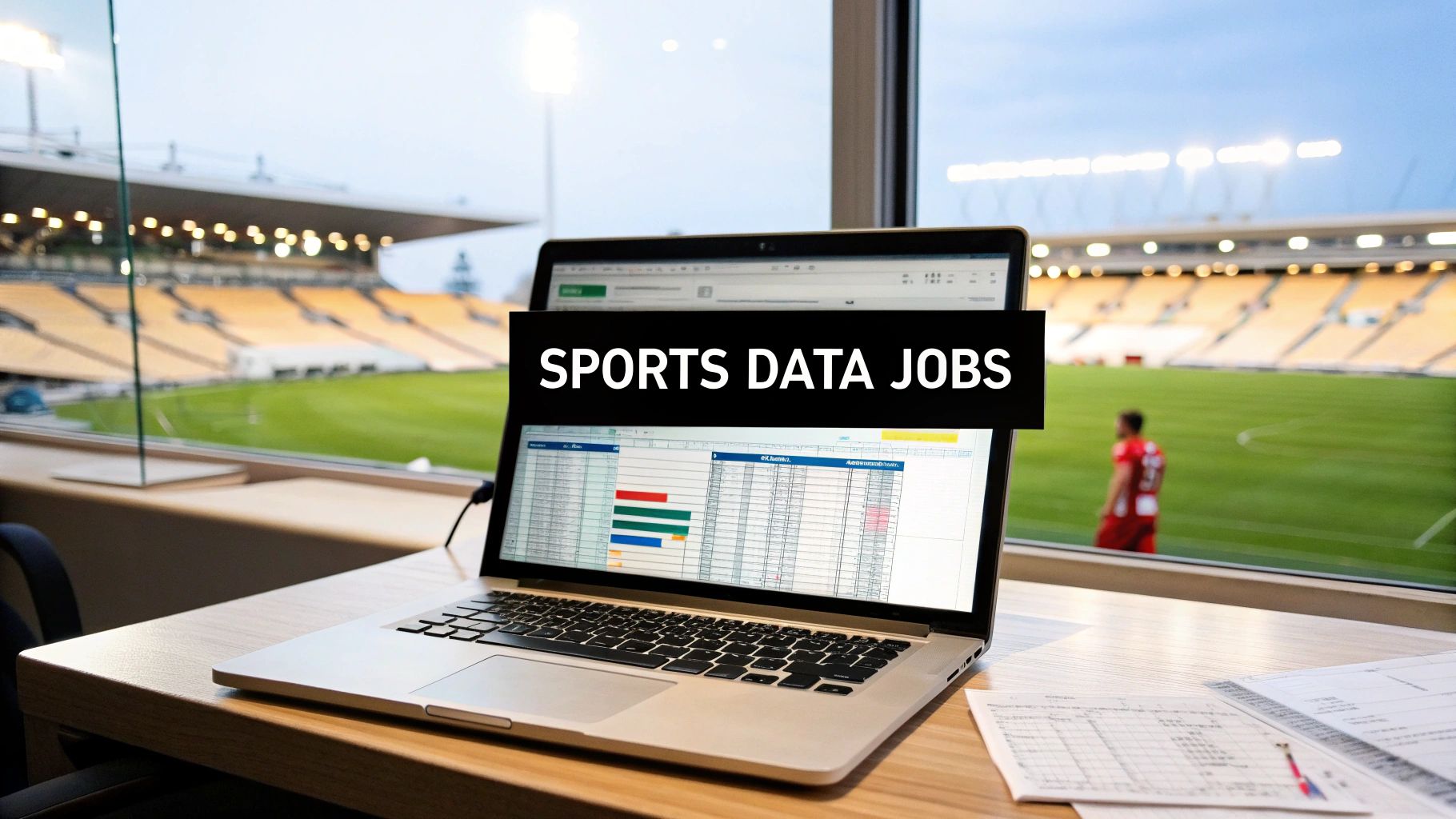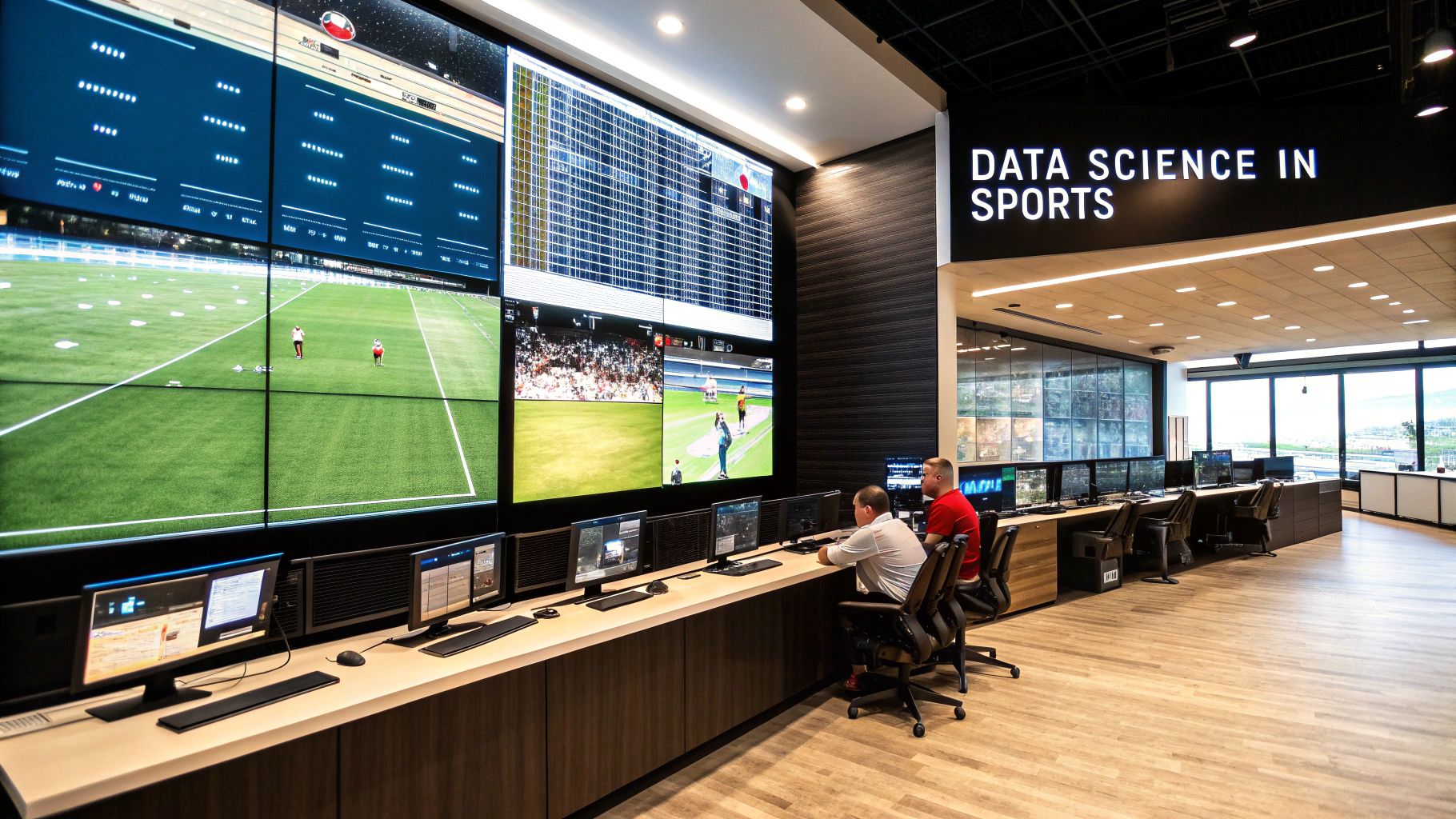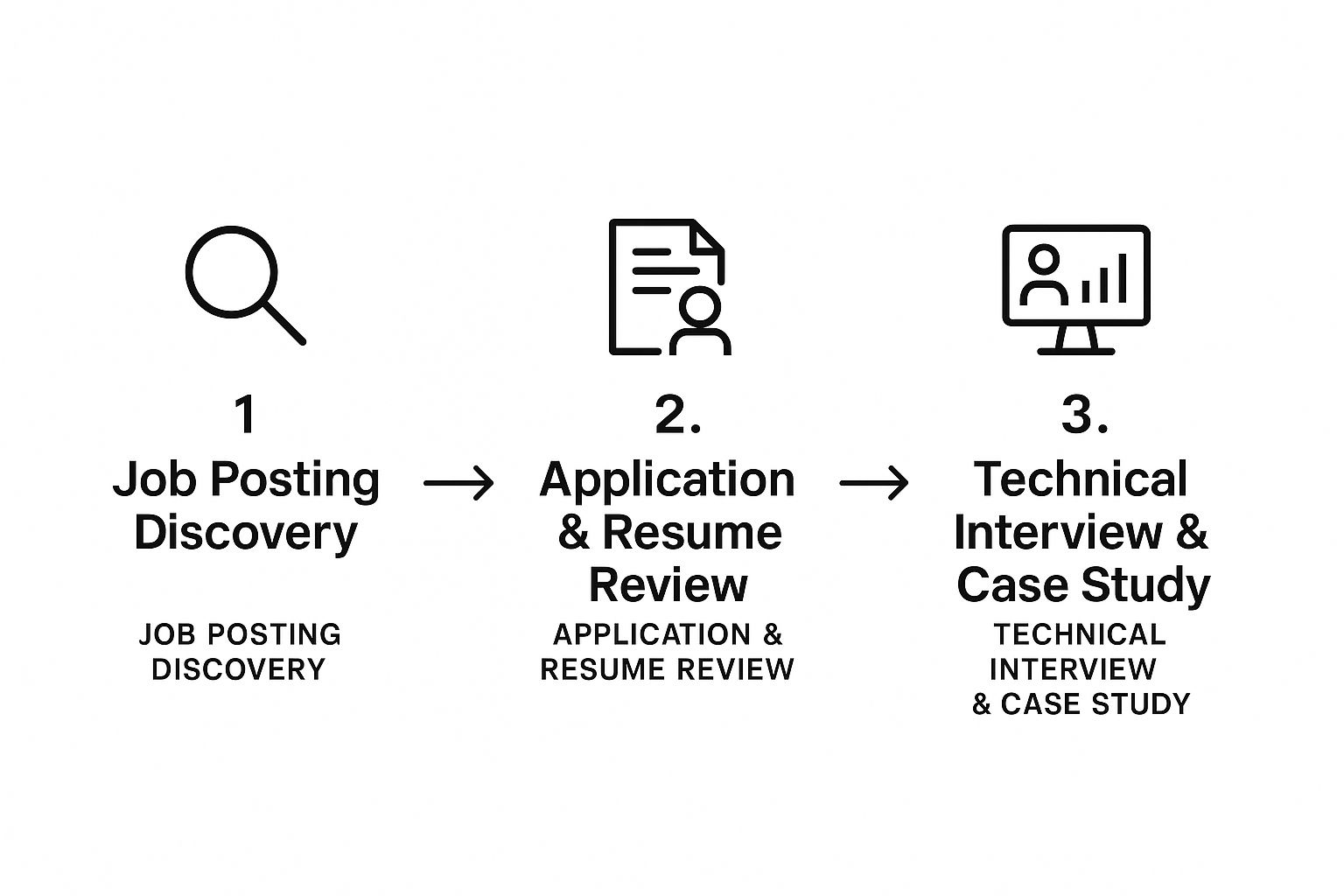
How to Land Data Science Jobs in Sports
Let's be honest, data science jobs in sports are no longer a weird niche. They're quickly becoming a core part of how winning teams operate. These roles are all about using data to find a competitive edge, whether that's in player performance and recruitment or something less obvious like fan engagement and business strategies.
The New Playing Field in Sports Analytics

The days of relying only on a coach's gut feeling or a scout's "eye test" are fading. Fast. Today, championships are just as likely to be won in a server room as they are on the court or field. Data science has become the new standard, giving teams insights that would have seemed like science fiction a decade ago. It’s a fundamental shift in how sports organizations compete.
And this isn't just a small trend—it's an absolute explosion. The global sports analytics market is expected to hit a massive $4.6 billion by 2025. That's a huge jump from just $880 million back in 2020. With a compound annual growth rate of 31.2%, it’s clear that teams are all-in on using data for everything. You can find more details on this industry expansion and what it means for jobs.
Data scientists have become critical players in the front office. Their job is to turn raw, messy numbers into clear, game-winning strategies that influence everything from the draft room to the marketing department.
Where Data Is Actually Making a Difference
The impact of data science in sports is incredibly broad, touching almost every part of a team's world. It’s not just one thing. Analytics delivers value across a huge spectrum of activities, which is great news because it creates a ton of different data science jobs in sports for people with all sorts of skills and interests.
Before we dive into the specific roles, it's helpful to see where data science is making the biggest waves within sports organizations. The table below breaks down the key domains and gives you a real-world feel for what the work actually looks like.
| Domain | Application of Data Science | Example |
|---|---|---|
| Player Performance | Analyzing player efficiency, modeling injury risk, and developing in-game strategies. | A soccer analyst tracks player movement data to identify defensive gaps in an opponent's formation. |
| Talent & Recruitment | Using predictive models to scout and draft players, identifying undervalued talent. | Projecting a college quarterback's likelihood of success in the NFL based on advanced metrics, not just stats. |
| Fan Engagement | Analyzing fan data to create personalized experiences and build stronger loyalty. | A team uses social media and ticket data to offer targeted merchandise discounts to specific fan segments. |
| Business Operations | Optimizing ticketing prices, stadium logistics, and sponsorship deals for maximum revenue. | A baseball club uses historical attendance data to set dynamic ticket prices for different matchups. |
As you can see, the work isn't just about what happens on the field. From player health to ticket sales, data is the common thread tying modern sports franchises together.
It's More Than Just On-Field Stats
Player Performance and Strategy: This is what most people think of first. Analysts build models to break down player efficiency, predict potential injuries, and find weaknesses in rivals. Think of a basketball analyst tracking every shot to figure out the most effective offensive plays. It's happening in every major league.
Talent Identification and Recruitment: Teams are now heavily leaning on data to scout and draft players, moving past the old-school "eye test." Models can project how a college athlete might perform professionally, helping teams find hidden gems that other franchises overlook.
Fan Engagement and Experience: Data gives teams a much clearer picture of who their fans are. By looking at ticket sales, social media activity, and merchandise purchases, organizations can tailor experiences that make fans feel more connected and, in turn, boost revenue.
Business Operations: At the end of the day, sports teams are big, complicated businesses. Data scientists are brought in to optimize everything from ticket prices and stadium logistics to massive sponsorship deals. Their goal is to make sure the organization is just as successful off the field as it is on it.
Key Takeaway: The demand for data skills isn't just about on-field analytics. Teams desperately need data pros to drive business decisions, create better fan experiences, and run smarter operations. This opens up a huge range of career paths.
Ultimately, sports data science is about one thing: finding hidden advantages. It's about answering the tough questions with real evidence, whether that question is "Who should we take with our first-round pick?" or "What's the best price for a season ticket?" As the industry keeps growing, the people who can answer those questions will be the real MVPs.
Finding Your Position on the Data Team

So, you want to be a sports data scientist? Great. First thing you need to realize is that "data scientist" is a huge umbrella term. Just like a championship team needs clutch shooters, lockdown defenders, and a deep bench, a modern analytics department needs a roster of specialists.
Figuring out where you fit is your first real play. A lot of people assume every data job in sports is about building predictive models for who’s going to win on Sunday. That's definitely a big piece of the puzzle, but it's far from the whole game. Teams and leagues are hiring for very different roles that solve completely different problems—from in-game tactics to season ticket renewals.
This variety is actually a massive advantage for you. The number of jobs is growing steadily across all these specializations. A quick search will turn up dozens of roles, from part-time data scouts to senior quants. The pay varies just as much. You might see a data scout role starting around $12 an hour, while an associate data scientist in the NFL can pull in between $90,000 and $120,000. Don't just take my word for it; check out some current sports data science job openings to get a feel for the landscape.
The On-Field Strategists: Player and Quantitative Analysts
These are the roles that get all the headlines. If you love the X's and O's and want your work to directly impact what happens on the court or field, this is your zone.
Player Performance Analyst: Think of yourself as part of the high-performance staff. You're obsessed with the athletes themselves—monitoring their physical load with GPS data, using biometrics to flag injury risks, and working with coaches to make sure training is optimized. Your main job is to keep players on the field and performing at their absolute peak.
Quantitative Analyst (Quant): Quants are the strategists. You’re building the complex statistical models that coaches use to get an edge. A basketball quant might model lineup efficiency against a zone defense; a baseball quant could analyze thousands of pitches to find an opponent's weakness.
When you're in one of these roles, your analysis directly translates into game-day decisions. You might see a starting lineup change or a new defensive scheme get implemented because of a report you wrote. It demands an encyclopedic knowledge of the sport and, just as importantly, the ability to explain your complex findings to coaches who don't have a Ph.D. in statistics.
A Day in the Life: You're the performance analyst for a Premier League club. After a tough 90-minute match, you’re digging into the GPS data. You spot that your star midfielder ran 20% more high-intensity sprints than his season average. You immediately flag this for the coaching staff, recommending a lighter training day to keep him from pulling a hamstring before the championship game.
The Off-Field Business Drivers
Not all the critical action happens between the lines. A team is a business, and data is the engine that drives its financial success. These roles are all about connecting the front office to the fanbase.
Fan Engagement and Marketing Analyst
This is where you focus on the lifeblood of the team: the fans. You're the one analyzing ticketing data, social media chatter, and merch sales to understand who the fans are, what they care about, and how to keep them coming back.
The problems you're solving are pure business. For instance, you might use demographic data to craft a targeted ad campaign for a new family ticket package. Or you could analyze which Instagram posts get the most engagement to help the marketing team create content that truly connects with the community.
You'll be working hand-in-hand with the marketing, sales, and corporate partnership teams. Here, success isn't measured in wins and losses, but in sold-out stadiums, higher fan retention, and bigger sponsorship deals. Your work keeps the lights on and ensures the team is healthy for years to come.
Developing a Championship-Level Skillset
Getting a top data science job in sports is about more than just loving the game. It’s about a very specific mix of raw technical skills, sharp analytical thinking, and an almost obsessive understanding of whatever sport you’re targeting.
Slapping "Python" and "R" on your resume just won't cut it. You have to prove how you can use those tools to solve the real problems a team faces every single day.
Think of it this way: a team's General Manager needs clear, actionable intel, not a messy Jupyter notebook. Your entire job is to be the bridge between the raw data and the winning decision. Mastering the core technical skills is just the price of admission. The real magic happens when you connect those skills directly to the game.
The Technical Foundation of Sports Analytics
Your technical toolkit is what gets you in the door. Period. Without a rock-solid command of data manipulation, statistical modeling, and database management, you won’t get a second look. These are the absolute non-negotiables that hiring managers scan for first.
A few key areas to pour your energy into:
- Programming Proficiency: Python and R are the clear MVPs. Python, with its powerful libraries like pandas for data work and scikit-learn for machine learning, is your go-to for everything from cleaning messy player-tracking data to building predictive models. R is still a beast for deep statistical analysis, especially in more academic or research-focused roles.
- Database Management: Teams are swimming in data—ticketing info, player biometrics, scouting reports, you name it. A deep understanding of SQL is non-negotiable. You have to be able to pull, join, and manage complex databases without breaking a sweat.
- Data Visualization: A brilliant model is worthless if the coach can't understand it. That's where tools like Tableau or Python libraries like Matplotlib and Seaborn come in. They help you turn dense numbers into a simple, compelling story through charts and dashboards.
Imagine a basketball analyst. They might use SQL to pull every single shot a player took against a specific defensive set. Then, they’d jump into Python and pandas to crunch the numbers on shot efficiency. Finally, they'd fire up Tableau to build a shot chart that visually screams to the coach, "He torches them from this spot on the floor!"
Beyond the Code: Domain Knowledge and Storytelling
This is what separates the good candidates from the ones who get hired. Anyone with a technical background can build a model. A true sports data scientist can explain what that model actually means for winning a championship. This boils down to two skills that are often ignored but are absolutely critical.
First up is deep domain knowledge. You have to live and breathe the sport. Know its history, its unwritten rules, its evolving strategies, and its unique lingo. Knowing what "Expected Goals (xG)" really means in soccer or why "WAR (Wins Above Replacement)" is a foundational concept in baseball shows you’re not a tourist—you speak the language. This context is what helps you ask the right questions of the data in the first place.
Key Insight: Technical skills will land you the interview. Domain knowledge and communication will land you the job. Teams need an analyst who gets the game, not just the code.
Second, you need to master the art of storytelling. You're a translator. Your audience isn't a room full of data nerds; it's coaches, scouts, and GMs who need simple, powerful insights to make multi-million dollar decisions. You have to take a complex statistical output and turn it into a clear story.
Don't say, "Our model shows a 0.78 correlation between Player A's sprint velocity and goal-scoring opportunities."
Instead, say, "When Player A hits top speed, we create way more scoring chances. We need to find plays that get him the ball in open space." See the difference?
This unique blend of skills is exactly what teams are hunting for. To see it in action, check out real-world job postings, like this one for a Data Scientist role. You'll notice they almost always emphasize the need for both technical chops and great communication.
To give you a clearer picture, here’s a quick summary of the skills you need to become that well-rounded candidate every team wants.
Core Skills for a Sports Data Scientist
| Skill Category | Specific Skill | Why It's Important in Sports |
|---|---|---|
| Technical | Python (pandas, scikit-learn) | The workhorse for cleaning data, running analyses, and building predictive player models. |
| Technical | SQL | Essential for accessing and managing the massive databases of player, team, and fan information. |
| Analytical | Statistical Modeling | Used to create predictive models for everything from game outcomes to injury risk. |
| Analytical | Data Visualization (Tableau) | Turns complex data into intuitive dashboards that coaches and executives can understand instantly. |
| Soft Skill | Deep Domain Knowledge | Provides the context to ask relevant questions and interpret results in a meaningful way. |
| Soft Skill | Communication & Storytelling | Translates complex findings into clear, actionable advice that influences on-field strategy. |
Building this complete skillset definitely takes time and real effort. But if you focus on both the hardcore technical tools and the crucial human elements of communication and sports expertise, you’ll become the exact person every team is looking to hire.
Building a Portfolio That Stands Out
Let’s be honest. A generic portfolio filled with financial models or textbook machine learning projects won't get you noticed in the hyper-competitive world of data science jobs in sports. Teams and hiring managers don't just want to see that you understand data; they need proof you understand the unique pulse of their sport.
Your portfolio is your highlight reel. It needs to show you can solve real sports problems.
This means you’ve got to move beyond basic analyses. Instead of yet another simple win-loss prediction model, start thinking about projects that answer deeper, more interesting questions. Could you build a player valuation model to pinpoint undervalued prospects in the upcoming NBA draft? Or maybe analyze tactical formations in soccer using player tracking data to reveal a team's defensive weak spots?
These are the kinds of projects that show you have genuine passion and skill.
The Portfolio Golden Rule: Don't just show that you can work with data. Show that you can use data to think critically about the sport you love. Your projects should tell a compelling story that a coach or general manager would find genuinely insightful.
Sourcing Your Data
The first hurdle for any great project is getting your hands on quality data. Luckily, the sports analytics community is incredibly open, and there are some amazing free resources out there if you know where to look. The days of all the good stuff being locked away are over.
- Open-Source Data Providers: Companies like StatsBomb are legends for this. They generously release massive, detailed datasets for soccer, including event and tracking data from major competitions. This is professional-grade information, perfect for the kind of deep tactical analysis that gets you noticed.
- Sport-Specific Packages: If you're comfortable with code, R and Python have become data goldmines. Packages like
nflfastRfor American football,worldfootballRfor soccer, andpy-ballfor basketball let you pull years of play-by-play data right into your coding environment. It’s an incredible shortcut. - Data Aggregators: Platforms like Kaggle are absolute treasure troves. They host a huge variety of sports-related datasets uploaded by the community, covering everything from Formula 1 lap times to March Madness results.
Just take a look at Kaggle. A quick search for "sports" brings up a massive variety of datasets ready for you to dive into.

This screenshot just goes to show how easy it is to find the raw material for a fantastic portfolio project on player stats, game outcomes, and so much more. It's the perfect starting point.
Structuring Your Projects for Maximum Impact
Once you have your data and a killer idea, how you present your work is just as important as the analysis itself. Your goal is to showcase your entire workflow—from the messy data cleaning phase all the way to your final, insightful conclusion.
The industry standard is to host your projects publicly on a platform like GitHub. It’s a transparent way for hiring managers to see your code, your methodology, and your thought process. Even better is a personal blog or a simple portfolio website. This gives you a space to explain your findings in a more compelling, narrative format, complete with sharp visualizations.
Think of it this way: your portfolio is the first and most critical step in the hiring process.

As this process shows, your application and the projects you link to are the gatekeepers to a technical interview. An impressive project that speaks directly to a team’s needs, like for this basketball data scientist role, could be the very thing that gets your foot in the door.
A well-documented project proves you’re organized, detail-oriented, and can communicate complex ideas clearly—all non-negotiable skills for any data science job in sports.
Your Game Plan for Networking and Job Hunting
Having a slick portfolio and sharp technical skills gets you to the starting line. But that's it. To actually land one of the top data science jobs in sports, you need a real game plan for networking and job hunting.
The sports industry is famously tight-knit. Who you know is often just as important as what you know, and a passive approach just won't cut it. You can't just fire off resumes and hope for the best. You have to actively get in front of the right people and prove you belong.
Where to Find Open Positions
Even the best networker needs to know where teams officially post their openings. Keeping a close eye on a few key job boards is your first assignment. These are the primary channels front offices use when they're looking for new talent.
Here are the places you absolutely must be monitoring:
- Teamwork Online: This is, without a doubt, the most dominant job board in the North American sports industry. If a major league team, minor league affiliate, or sports organization is hiring, chances are the role is posted here. It's essential.
- Club and League Websites: Don't forget to go straight to the source. Always check the "Careers" section on the websites of teams you're interested in. Sometimes, roles pop up there exclusively before hitting the bigger job boards.
- LinkedIn: Many recruiters and analytics department heads will post openings directly to their networks. Following the key players in the industry is a no-brainer.
Here’s a glimpse of the Teamwork Online interface. You need to get very familiar with this site.
The platform’s filters are your best friend. You can drill down by league, team, and job category, which makes it incredibly easy to zero in on the data science roles that matter to you.
Key Takeaway: While networking opens doors, consistently checking job boards like Teamwork Online is non-negotiable. Set up alerts for keywords like "data analyst," "quantitative analyst," and "data scientist" to stay ahead of the pack.
The Power of Authentic Networking
Let's be honest: applying online often feels like sending your resume into a black hole. Networking is what pulls you out of that slush pile and puts your name in the "must-interview" stack.
But there’s a right way and a wrong way to do it. The goal isn't to ambush people and ask for a job. It's about building genuine connections by showing your passion and expertise.
- Engage on X (Formerly Twitter): The sports analytics community on X is vibrant, smart, and surprisingly accessible. Follow analysts, writers, and data scientists. But don't just lurk—join the conversation. Share your own analyses, ask thoughtful questions, and offer real insights on their work.
- Attend Industry Conferences: Events like the Sloan Sports Analytics Conference are the Super Bowl of the industry. Tickets can be pricey, but attending even once can be a legitimate game-changer. It's your single best chance to meet the people behind the models you admire.
- Contribute to Open-Source Projects: Find a sports-related project on GitHub and get involved. Fixing a bug, improving the documentation, or adding a small feature is a powerful way to show off your skills and collaborate with people already working in the field.
Tailoring Your Application for the Win
When you finally find that perfect job opening, a generic application is the kiss of death. Every single resume and cover letter must be meticulously tailored to the specific team and sport.
Hiring managers are looking for people who "get it." They can spot a generic, copy-pasted application from a mile away.
For example, the world of football (soccer) has gone all-in on data. Top clubs like Southampton FC and Manchester United now employ data scientists for everything from player recruitment to injury prevention. With at least 11 data science jobs in football at major UK clubs as of mid-2025, it’s obvious that data is now central to how they operate.
This means your application has to speak their language. If you're applying to a Premier League club, your portfolio better feature a project on Expected Goals (xG) or pass network analysis, not a baseball project on pitch framing. Show them you understand their world and their unique challenges.
To find more niche opportunities, it pays to look beyond the biggest platforms. Our own board, for instance, often features unique roles, like this Data Scientist role with a leading baseball organization. When you apply, use sport-specific terminology, reference team-specific stats, and make it crystal clear that your only goal is to help that team win.
Answering Your Questions About a Career in Sports Analytics
 As you start to figure out your path toward landing one of those coveted data science jobs in sports, it's only natural to have a few practical questions. The journey isn't always a straight line, and let's be honest, job descriptions rarely paint the full picture.
As you start to figure out your path toward landing one of those coveted data science jobs in sports, it's only natural to have a few practical questions. The journey isn't always a straight line, and let's be honest, job descriptions rarely paint the full picture.
This section tackles the most common questions I see from aspiring sports data scientists. My goal is to give you direct, honest answers so you have the clarity and confidence to make your next move. Let's get into the real-world concerns that can make or break a career transition.
Do I Need a Master's or PhD?
This is probably the question I get asked most. While a master's or PhD in data science, statistics, or a similar field can definitely help, it's not always a hard requirement.
I've seen many teams and sports organizations prioritize a strong, relevant portfolio and real-world skills over specific degrees. A bachelor's in a quantitative field like computer science or economics, paired with practical projects that solve actual sports problems, can often be more powerful than a graduate degree that lacks a portfolio.
But there's a flip side. For those highly specialized research and development (R&D) roles—the ones creating brand-new algorithms for player tracking or biomechanics—an advanced degree is usually preferred, if not required. These jobs demand a deep theoretical foundation that you typically only get from graduate-level studies.
Where Can I Find Sports Data for My Portfolio?
Great question, and the answer is better than you might think. A massive amount of high-quality sports data is out there for free, which is perfect for building the kind of standout projects we've been talking about.
Here are a few of my go-to sources to get you started:
- Open Data from Companies: Organizations like StatsBomb are incredibly generous, offering free soccer data that includes detailed event and positional info from major leagues.
- Sport-Specific Packages: If you're working in R or Python, you can pull play-by-play data directly with packages like
nflfastRfor American football orpy-ballfor basketball. - Kaggle Datasets: The data science community on Kaggle is always uploading and maintaining a huge variety of sports datasets. They're perfect for analysis and modeling.
These resources give you all the raw material you need to prove you can handle and find insights in complex, real-world sports information.
Key Takeaway: You don't need access to a team's private servers to build an impressive portfolio. The open-source community provides more than enough high-quality data to prove your skills and passion for sports analytics.
What Is the Biggest Mistake Applicants Make?
The single biggest mistake I see? Submitting a generic application. Sports organizations are flooded with résumés from smart data scientists, but they're looking for something extra: a genuine passion for their sport.
A portfolio packed with financial modeling or e-commerce projects, no matter how technically brilliant, just won't land with a baseball club's GM. You have to speak their language.
This means referencing sport-specific metrics (like "Expected Goals" for soccer or "WAR" for baseball) and showcasing projects that are directly relevant to that specific team. Your cover letter is your shot to explain why you want to help that team win, not just any team. Show them you're a fan who also happens to be a data expert.
Can I Switch into Sports Analytics from Another Field?
Absolutely. Your core data science skills—programming, statistical analysis, machine learning—are incredibly transferable. The most important thing you need to do is prove you can apply those skills in a sports context.
The key is immersion. Dive deep into the analytics of the sport you're targeting. Follow the top analysts and data journalists on platforms like X (formerly Twitter) to learn the terminology and the latest trends. Most importantly, build one or two high-quality portfolio projects using data from that sport.
This focused effort signals to hiring managers that you're not just a tourist. It shows you're serious about the industry and have already started building the bridge from your technical background to their world.
Ready to find your place on the team? At Sportsjobs Online, we connect talented data professionals with the best opportunities in the sports world. Explore current openings and start your journey today at https://www.sportsjobs.online.
Hundreds of jobs are waiting for you!
Subscribe to membership and unlock all jobs
Sports Analytics
We scan all major sports and leagues
Updated Daily
New jobs are added every day as companies post them
Refined Search
Use filters like skill, location, etc to narrow results
Alerts
You can get daily alerts in your email for a specific search
Access to job postings from top teams and companies
Daily updates and notifications based on your preferences
🎯 Over 90% of customers chose to renew their subscriptions after the initial sign-up
Monthly
$6.99
per month
✓ Flexible monthly billing
✓ Unlimited access to all jobs
✓ Advanced filtering tools
✓ Daily job alerts
✓ Exclusive discount codes
✓ Cancel anytime
BEST VALUE
Yearly
$39
per year • Only $3.25/mo
✓ Save 50% vs monthly
✓ Unlimited access to all jobs
✓ Advanced filtering tools
✓ Daily job alerts
✓ Exclusive discount codes
✓ Cancel anytime
Lifetime
$59
one-time • forever
✓ Pay once, access forever
✓ Unlimited access to all jobs
✓ Advanced filtering tools
✓ Daily job alerts
✓ Exclusive discount codes
✓ Best long-term value